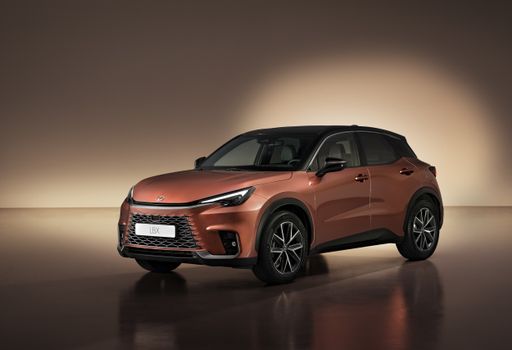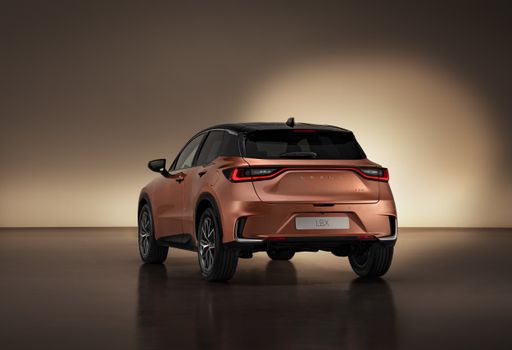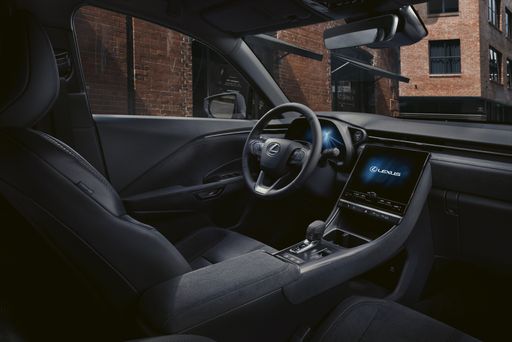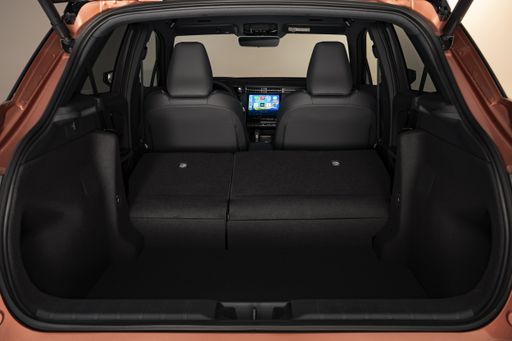Lexus LBX VS Toyota C-HR
In the competitive subcompact crossover segment, the Lexus LBX and Toyota C-HR stand out with their unique blend of style and performance. The LBX offers a more luxurious interior and advanced features, while the C-HR remains a budget-friendly option that doesn't compromise on flair. Ultimately, both vehicles cater to different tastes, making the choice between them a reflection of personal preferences in luxury and practicality.
Lexus LBX
The Lexus LBX represents a new era of compact luxury crossovers, blending a sleek design with exceptional craftsmanship. This model offers an impressive balance of performance and comfort, making it an appealing option for urban driving and longer journeys alike. Inside, the cabin features high-quality materials and innovative technology, ensuring a driving experience that is both sophisticated and connected.
detailsToyota C-HR
The Toyota C-HR stands out with its distinctive and bold design that combines sleek, angular lines with a sporty posture. Its comfortable and stylish interior is equipped with advanced technology features, providing a seamless driving experience. The vehicle offers impressive handling and performance, making it a compelling choice for those who appreciate a blend of practicality and flair on the road.
detailsIntroduction: A Clash of Compact SUVs
In the competitive world of compact SUVs, the Lexus LBX and Toyota C-HR have emerged as two strong contenders for drivers seeking efficiency, style, and innovative technology. Both models, hailing from synonymous automotive roots, showcase the balance of luxury and practicality. This article will provide a detailed comparison of the technical specifications and innovations each vehicle offers, helping buyers make an informed decision.
Design and Dimensions
The Lexus LBX exhibits a refined and sleek design that is locally indicative of the brand's luxury quotient, featuring a bold front grille and elegantly sculpted body lines. Measuring 4190 mm in length, 1825 mm in width, and 1560 mm in height, the LBX has a compact yet commanding presence on the road.
On the other hand, the Toyota C-HR stands slightly taller at 1558 mm and is marginally longer at 4362 mm, showcasing a distinct sporty profile with sharp edges and a dynamic rear design. This SUV provides a bit more legroom for passengers with its spacious seating for five compared to the LBX's four seats.
Engine and Performance
The Lexus LBX is powered by a full hybrid engine, generating 136 HP from its 1490 cm³ three-cylinder engine. It delivers impressive fuel efficiency, achieving a consumption rate of 4.5 to 4.8 L/100 km. With a torque rating of 185 Nm, the LBX accelerates from 0 to 100 km/h in just 9.2 seconds, making it a commendable choice for those who appreciate spirited driving.
In contrast, the Toyota C-HR offers a wider range of power options, featuring not just the full hybrid model but also a plug-in hybrid variant. The power output can reach up to 223 HP with its 1987 cm³ four-cylinder engine. The C-HR leads in terms of performance, with acceleration times ranging from 7.4 to 9.9 seconds, depending on the model selected. With fuel consumption ranging from 4.7 L/100 km to an astonishing 0.8 L/100 km for the plug-in hybrid, it caters to various consumer needs.
Driving Dynamics and Handling
Both vehicles offer front-wheel-drive and all-wheel-drive options. The Lexus LBX aims to provide a smooth, comfortable ride suitable for urban environments, thanks to its 1280-1365 kg curb weight, allowing for easier maneuverability.
The Toyota C-HR, heavier with a curb weight of 1505-1755 kg, is designed with a slightly sportier focus. With its dynamic suspension setup and various engine configurations, the C-HR delivers an engaging driving experience, especially in the more performance-oriented variants.
Interior Comfort and Technology
Inside, the Lexus LBX offers a luxurious cabin enriched with high-quality materials and state-of-the-art technology. Features include a touchscreen infotainment system, premium audio, and multiple safety innovations that are emblematic of the brand's commitment to luxury.
The Toyota C-HR, while also tech-savvy, emphasizes functionality and user-friendliness. Its larger trunk capacity of 350 to 447 L ensures practicality for everyday use and trips alike, embedding itself as a versatile competitor.
Efficiency and Environmental Impact
Both cars excel in terms of emissions reduction. The Lexus LBX emits 102-109 g/km of CO2, classifying it within a respectable efficiency bracket. The Toyota C-HR's emissions vary from 105 to a commendable 19 g/km for its plug-in hybrid option, showcasing its adaptability to eco-conscious consumers.
Conclusion: Which One Should You Choose?
In summary, the Lexus LBX and Toyota C-HR present appealing options for compact SUV enthusiasts. The LBX leans heavily on luxury and premium hybrid performance, relaxing its drivers in comfort and style. Meanwhile, the C-HR is versatile, offering a wider range of engines and practicality, making it suitable for a variety of lifestyles.
Ultimately, your choice will depend on what you prioritize more: luxury and enhanced driving experience with the Lexus LBX or versatility and performance with the Toyota C-HR. Whatever the choice, both models uphold their brands’ legacies of reliable, innovative vehicles that cater to modern needs.
 @ newsroom.lexus.eu
@ newsroom.lexus.eu
 @ newsroom.lexus.eu
@ newsroom.lexus.eu
 @ newsroom.lexus.eu
@ newsroom.lexus.eu
 @ newsroom.lexus.eu
@ newsroom.lexus.eu
 @ Toyota
@ Toyota
 @ Toyota
@ Toyota
 @ Toyota
@ Toyota
 @ Toyota
@ Toyota
 @ Toyota
@ Toyota

|

|
|
|
|
Costs and Consumption |
|
|---|---|
|
Price
about 30500 - 42700
$
|
Price
about 32300 - 46200
$
|
|
Consumption L/100km
4.5 - 4.8
L
|
Consumption L/100km
0.8 - 5.1
L
|
|
Consumption kWh/100km
-
|
Consumption kWh/100km
-
|
|
Electric Range
-
|
Electric Range
67
km
|
|
Battery Capacity
-
|
Battery Capacity
-
|
|
co2
102 - 109
g/km
|
co2
19 - 115
g/km
|
|
Fuel tank capacity
36
L
|
Fuel tank capacity
43
L
|
Dimensions and Body |
|
|
Body Type
SUV
|
Body Type
SUV
|
|
Seats
4
|
Seats
5
|
|
Doors
5
|
Doors
5
|
|
Curb weight
1280 - 1365
kg
|
Curb weight
1505 - 1755
kg
|
|
Trunk capacity
255 - 332
L
|
Trunk capacity
350 - 447
L
|
|
Length
4190
mm
|
Length
4362
mm
|
|
Width
1825
mm
|
Width
1832
mm
|
|
Height
1560
mm
|
Height
1558 - 1564
mm
|
|
Payload
455 - 475
kg
|
Payload
375 - 425
kg
|
Engine and Performance |
|
|
Engine Type
Full Hybrid
|
Engine Type
Full Hybrid, Plugin Hybrid
|
|
Transmission
Automatic
|
Transmission
Automatic
|
|
Transmission Detail
CVT
|
Transmission Detail
CVT
|
|
Drive Type
Front-Wheel Drive, All-Wheel Drive
|
Drive Type
Front-Wheel Drive, All-Wheel Drive
|
|
Power HP
136
HP
|
Power HP
140 - 223
HP
|
|
Acceleration 0-100km/h
9.2 - 9.6
s
|
Acceleration 0-100km/h
7.4 - 9.9
s
|
|
Max Speed
170
km/h
|
Max Speed
175 - 180
km/h
|
|
Torque
185
Nm
|
Torque
-
|
|
Number of Cylinders
3
|
Number of Cylinders
4
|
|
Power kW
100
kW
|
Power kW
103 - 164
kW
|
|
Engine capacity
1490
cm3
|
Engine capacity
1798 - 1987
cm3
|
|
Top speed
170
km/h
|
Top speed
175 - 180
km/h
|
General |
|
|
Model Year
2024
|
Model Year
2024
|
|
CO2 Efficiency Class
C
|
CO2 Efficiency Class
C, B
|
|
Brand
Lexus
|
Brand
Toyota
|
Lexus LBX
Introducing the Lexus LBX: A New Age of Compact SUVs
The highly anticipated Lexus LBX has revolutionised the compact SUV market, delivering a perfect blend of luxury, efficiency, and performance. With a strong emphasis on hybrid technology, this new model sets a high standard for the environmentally conscious motorist while not compromising on style or innovation.
Under the Bonnet: Technical Mastery
The Lexus LBX is powered by an advanced full-hybrid drivetrain, with a capable engine that deftly combines efficiency and power. Its 1.5-litre, 3-cylinder engine is paired with a CVT automatic gearbox, producing a commendable 136 PS and 100 kW of power. This setup ensures smooth transitions and a seamless driving experience.
The choice between front-wheel and all-wheel drive ensures that drivers can tailor the LBX to their specific needs. The front-wheel drive variant boasts an impressive consumption rate of 4.5 L/100km, while the all-wheel drive models achieve 4.8 L/100km. With CO2 emissions ranging from 102 to 109 g/km, the LBX stands out as a sustainable choice in its class.
Performance and Efficiency
The Lexus LBX doesn’t just excel in fuel efficiency. Its performance statistics are noteworthy, with an acceleration of 0-100 km/h in just 9.2 to 9.6 seconds, and a top speed of 170 km/h. The hybrid system provides a combined torque of 185 Nm, delivering an energetic drive without compromising on environmental considerations.
Despite its compact design, the Lexus LBX offers a substantial boot space of 255 to 332 litres, making it ideal for everyday use and weekend escapades. The SUV's dimensions—measuring 4190 mm in length, 1825 mm in width, and 1560 mm in height—ensure it is suitably compact for urban driving while providing ample interior space.
Innovation in Design
Lexus pushes the boundaries of SUV design with the LBX by offering a modern and elegant aesthetic alongside its technical features. The model is available in several trim levels, including e-CVT, Elegant e-CVT, and the more dynamic Emotion E-FOUR e-CVT, each designed to cater to different tastes and preferences.
Interior features focus on comfort and connectivity, providing a plush environment with advanced infotainment options that seamlessly integrate with daily life. The LBX seats four comfortably, making use of high-quality materials that reflect the premium nature of the brand.
Price and Value Offering
The Lexus LBX comes with an accessible price range of €32,990 to €46,190, offering a luxurious entry into the world of hybrid SUVs. Considering its monthly operational costs ranging from €920 to €1,088, the LBX offers economical running alongside its ecological advantages, making it a smart choice for the discerning driver.
In conclusion, the Lexus LBX captures the essence of what a modern compact SUV should offer: performance, efficiency, and luxury all wrapped in a package that respects the environment. It is a noteworthy addition to the Lexus family, sure to capture the hearts of drivers everywhere.
Toyota C-HR
Revolutionising the Crossover Segment: The Toyota C-HR
The Toyota C-HR has firmly established itself as a standout contender in the compact crossover segment. Known for its distinct design and hybrid capabilities, the C-HR continues to prioritise innovation and efficiency. In this article, we delve into the technical details that make the 2024 iteration a compelling choice for discerning buyers.
Distinctive Design and Aerodynamics
The Toyota C-HR boasts a striking design that combines angular lines with modern aesthetics. This isn't merely for show; the design enhances aerodynamics, improving fuel efficiency and handling. With dimensions of 4362mm in length and a sophisticated structure, the C-HR strikes a balance between urban agility and on-road stability.
Impressive Hybrid Powertrains
The C-HR lineup offers innovative hybrid and plug-in hybrid drivetrain options. The full hybrid system is tailored for those who seek both economic and environmental benefits. It combines a petrol engine with an electric motor to deliver power outputs ranging from 140 to 223 PS, achieving remarkable fuel consumption rates from 0.8 to 5.1 L/100km. The 2.0 Plug-In Hybrid variant impresses with an electric range of 67 km, ideal for urban commuters.
Unmatched Efficiency and Performance
Acceleration figures for the C-HR range from 7.4 to 9.9 seconds to reach 0-100 km/h, ensuring a responsive driving experience. Maximum speeds between 175 and 180 km/h cater to those who appreciate a bit of zest on the open road. Coupled with CVT automatic transmission and both front-wheel and all-wheel-drive configurations, the C-HR adapts to various driving conditions with ease.
Advanced Technology and Features
Inside, the C-HR is equipped with the latest technology aimed at providing connectivity and comfort. The model hosts an array of features across its diverse trim levels, including Business Edition, Lounge, and the sporty GR SPORT. Each variant is designed to meet the demands of different lifestyles, ensuring there's a C-HR model to suit every taste.
Sustainability and Cost Efficiency
With CO2 emissions ranging from 19 to 115 g/km, the C-HR stands as a testament to Toyota's commitment to sustainability. Financially savvy consumers will also appreciate the running cost, with monthly expenses from €959 to €1204, and a cost per km as low as 38.4 cents. Such efficiency makes the vehicle an attractive option for eco-minded buyers.
Conclusion: A Forward-Thinking Choice
The 2024 Toyota C-HR embodies Toyota's forward-thinking approach to automotive innovation, blending eco-friendly hybrid technologies with stylish design and practicality. It offers a glimpse into the future of driving, where efficiency meets elegance. Whether you're a city dweller or an adventure seeker, the C-HR promises a driving experience that is both enjoyable and environmentally conscious.
